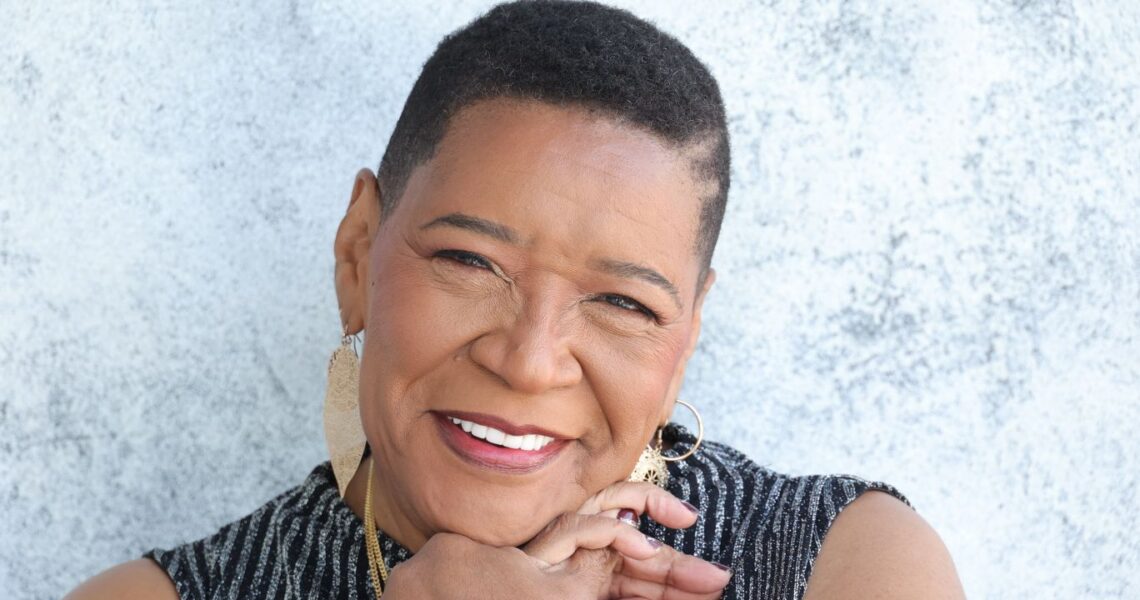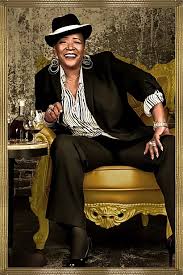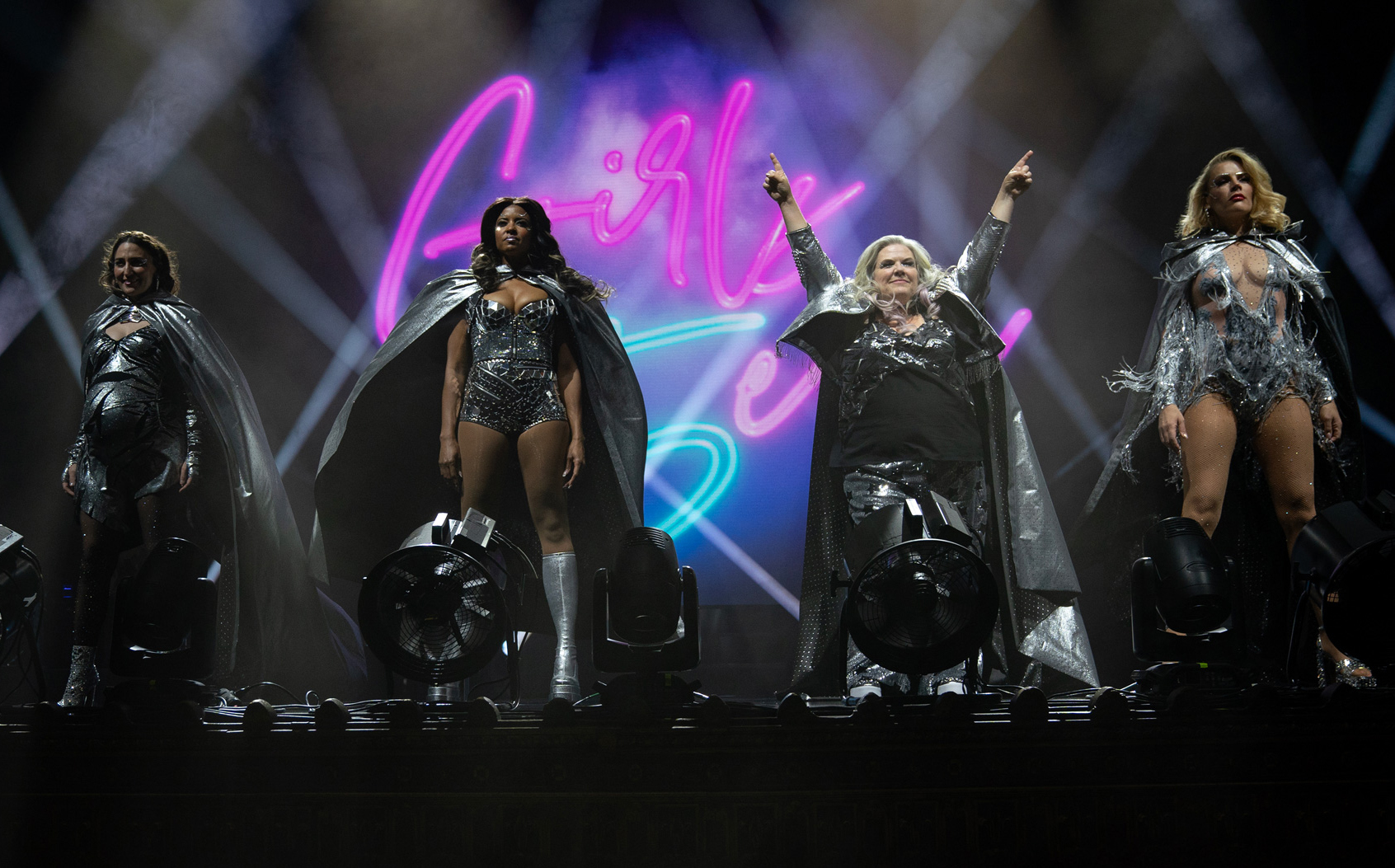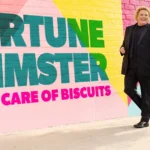She’s baaaack! After a 20-year retirement from the business, actor and comedian Marsha Warfield is back on the scene, openly out, has a lot to say. Politics, coming out, her role as a black woman in society, and even pizza… at age 70 she’s not shying away this time. Not even meaning to, Marsha made national fame for her role as Roz in Night Court during the ‘80s and ‘90s. This year, she returned to the role for the reboot, and as life imitates art, her character is also out and proud and newly married to a woman. Representation has certainly come a long way.
Marsha grew up on the South Side of Chicago. Right away, she learned the basics of life and human interaction, and she would start to find her way into comedy.
I’ve been putting a phrase into my act, pretty much words to live by – “people have been people-ing since people were people.” Once you understand that human beings are people and that they’re all human – unlike what we’re taught, we’re taught some people are lesser human – and there are a series of sliding scales that put people in lesser positions, and you’re born into them – a lot of times without having any idea that you are or who you are or what you are – once you slip all of that and strip all that away in your mind and just start looking at things and just remember people have been people-ing since people were people.
I was always interested in comedy, standup, and the whole thing from a small child. I grew up on variety shows and there were always comedians and singers and dancers and performers, and I always watched them. But it was also the ‘60s, so I had no idea that there was a path for me, that just didn’t exist as a possibility. Like walking on the moon didn’t exist before 1969, it wasn’t something that I could conceive of.
It was that environment that helped Marsha come into her own sense of humor and wit.
I always hate the phrase class clown because it kind of suggests an idiot. It’s like somebody who makes funny faces and asks you to pull their finger. Where I’m from, people played the Dozens, which was basically now what they call rap battles when they set it to music. You just talk about people. And, in a lot of ways, if you could do that, you didn’t have to fight. If you rank them, then they lose all status. I got pretty good at that and good at being silly.
In 1974, Marsha saw an article in the Chicago paper promoting an open-mic night at the Pickle Barrel with comedian Tom Dreesen. Working at an answering service at the time, this industry jargon was new to her. She finally made her way to the club and would see comedians like Judy Tenuta and Brad Sanders in action. Finally, it was her turn.
They called all the new comedians “virgins.” I was 20, and I walked on stage, at about two in the morning. It was the comics and a couple of the drunks and some people cleaning up. I went on stage and said, “Good evening. My name is Marsha Warfield, and I’m a virgin, so please be kind.” They laughed. And I was hooked.
When Marsha was 22, she packed up and left for Los Angeles. The growing trend was for comedians to travel West. And those comedians that she saw at her first open-mic nights would become her peers and mentors. Was she nervous at all about leaving her life behind for an unventured territory?
I never thought about it. Never. It was 1976 when I left Chicago. People don’t understand the ‘60s – it was an amazing time. It was turbulent, it was like living in a popcorn machine, there was always something going off somewhere. There was a lot of change happening in a lot of things. I was growing up with rock and roll, Motown, the Civil Rights Movement, and the protest movement of that day. People were trying to make a world where we could just exchange flowers instead of confrontation. And you could do it, make things happen. At that time, young people had decided, or we had been manipulated to decide, that it was enough for you old people, over 30, you were out to pasture. I was coming of age at that time, so I thought about moving to Los Angeles or moving to San Francisco. People were actually thumbing rides across the country.
So, I had no fear. I didn’t understand my parents’ fear. I didn’t understand older people what they do. Everybody’s doing it. I never considered seriously coming back, even though I went home a couple of times. It’s not that I didn’t love Chicago or love my family, it was that Los Angeles had always had that kind of allure and pull on me even as a little girl.
As for Marsha’s burgeoning sexuality, she had an interesting take on it all, even early on.
I didn’t think that I wasn’t like all of the other girls, I thought other girls weren’t honest about being like me. Not just girls -boys, men – I didn’t understand the ultra-masculine feminine, that just seemed stupid to me. It seemed like posturing, like it wasn’t authentic. Like, what are you doing? What the hell? And so I was very much go with the flow. It wasn’t normal or accepted. I was groomed into heterosexual normality effectively from birth. Even as a child, I was a tomboy. I didn’t want a pink anything. I hated dolls. They smelled bad. And these little fake dead babies… why are you telling me to practice loving a little pink dead baby? I didn’t understand. It wasn’t until I got to high school that you’d hear little things – you’re mannish, you’re different, or whatever. It wasn’t until I was 23 that I really realized, oh – okay! I was never against the idea of having relationships with women. When I realized it was like – duh! And it was really a relief.
When Marsha came out to her mother, she made Marsha promise not to come out publicly while she was alive. What does Marsha think she was most afraid of?
Truthfully? Her image. I think most parents are afraid that they will be looked upon badly as bad parents as having failed, as having not been worthy. Then the indoctrination of God is going to send you (to hell) and you’re going to burn and all that stuff, that comes into play. I think it all comes together in that, what are people going to think? It sounds bad and horrible, but we do care about our images. I mean, they wouldn’t be selling makeup and your whole-body stinks stuff if we didn’t care what other people thought. There’s this whole notion of perfection, that there can be perfection in families and people. There are no perfect people. So, two people together aren’t going to be perfect. They’re going to get that much more imperfect. And so people trying to make their humanity fit into somebody’s imaginary perfect family – 2.5 kids and a dog and a station wagon back then – while watching them eat on TV trays – doesn’t work, your family didn’t look like that. We are not inclusive at all. And even when we talk about being inclusive, we’re really not.
Having come this far and looking back, would Marsha have made a different decision in keeping her sexuality under wraps?
Not unless it was this time, and then I would’ve made different decisions and probably have had an entirely different life from birth. But it wasn’t, and I can’t. At that time that request seemed reasonable. Your fear is that you’ll be turned out, that you’ll be hated, that your family will disown you and not talk to you. The fear of actually telling somebody how you are identifying and saying it out loud is terrifying. So I can understand the response from people who also have their own fears and stuff and give ’em a little grace. And so that was not unreasonable at the time.
After moving to Los Angeles, Marsha would appear at The Comedy Store. Comedian Paul Mooney happened to be there and was working on The Richard Pryor Show and invited her to join the show as a writer and performer. That was her big step in television, something that she had not considered before. Her audition for Night Court wasn’t really an audition, it was fate.
I was a standup from the time I stood on stage, and I never thought of myself as an actress. I never thought of myself in that role. I was not one of the people who was doing standup so that I could get a sitcom, I was doing standup ’cause I wanted to do standup. I had no real knowledge of Night Court.
The show was scrambling for a replacement. Already on air for a couple of years, Night Court had lost its two previous bailiff characters due to death by natural causes. Filming was set to begin with scripts already written. Show creator Reinhold Weege called Marsha to come to his house.
It was the middle of the summer and he had a fire going in the fireplace and the air conditioning on. I said, “Why do you have the fireplace going and the air conditioner?” He said, “Because I can.” I had on a pair of sweats and a T-shirt and had a pack of cigarettes, and I wasn’t carrying a purse. So, we started smoking and talking and found out he was from Chicago and we just had a nice little meeting. He asked me what I was doing, I told him I was going to Seattle to do standup. I got on a plane and went to Seattle. When I got off the plane, they said, call your agent. You got it. So that’s how that happened.
The show continued to be a hit. Among other successes in Marsha’s career were appearances on Family Ties, Cheers, an extended run on Empty Nest, and over 200 episodes of her own talk show. Was it odd having this success, yet hiding a big part of her life from the spotlight?
No. Hiding that part of my life was my life. People think maybe there were some choices made or decisions made by things planned out. No, that was my life. That’s how you navigate through the world. It was very weird how that was consciously subconscious, but it was internal.
Marsha came out publicly in 2017. Was she scared to finally come out?
Terrified. And it’s a look that you can identify on the street when you see someone trying to step out boldly into their identity – whatever it is – and know that they’re subject to that kind of judgment that we do care about. It can be threatening on a lot of levels – emotionally, physically, all kinds of ways. But I was 60-something, so it was such a relief, you know? Most people were cool, it’s almost like once I accepted me, everybody else did too.
A lot of it for me, and hopefully for everybody else, is once you get comfortable in your own skin, everybody else either embraces it or falls off. And so everything looks a lot easier, and you breathe a lot easier. You still have your little moments of thinking about other people’s judgment of you, but everything made a lot more sense. The things that were unnecessary, basically armor to arm me psychologically, are all gone, I don’t need that anymore.
After coming back from her retirement, she hit the comedy scene first. She says that she had to start at step 1, no one knew who she was. Her comedy show “The Book of Marsha” changed all that quickly. Bolder and brasher, she incorporates all elements of her life into her act and, at this point, doesn’t care who likes it or doesn’t. She returned to TV for a run in 9-1-1 and then onto her two-episode appearance on the Night Court reboot. Her character Roz also came out during Marsha’s absence, and the episodes featured her marriage to a woman. In Marsha’s personal life, she also is newly married. Her wife attended Marsha’s show, and the rest is history. A new start in her career, a new marriage…what does she think of all of it?
It’s serendipitous. Everything just seemed to flow. When you’re ready, the blessings will come. It might seem optimistic, and it probably is, but for me, it just seems that it’s all coming together and that my life to this point makes sense. It’s the life I imagine that I could never imagine, but it’s a life I would have wanted if I knew what the hell to want. It’s authentic.
And her message to the community this Pride Season?
Strut. Just strut. I love to see people with confidence, bravado, and that strut. You don’t owe anybody any explanations. You don’t owe anyone anything. And if it feels good, if it’s how you see yourself, do that. Strut. Work it. Go.
Follow Marsha on IG: @MarshaWarfield
Last modified: June 1, 2024
















